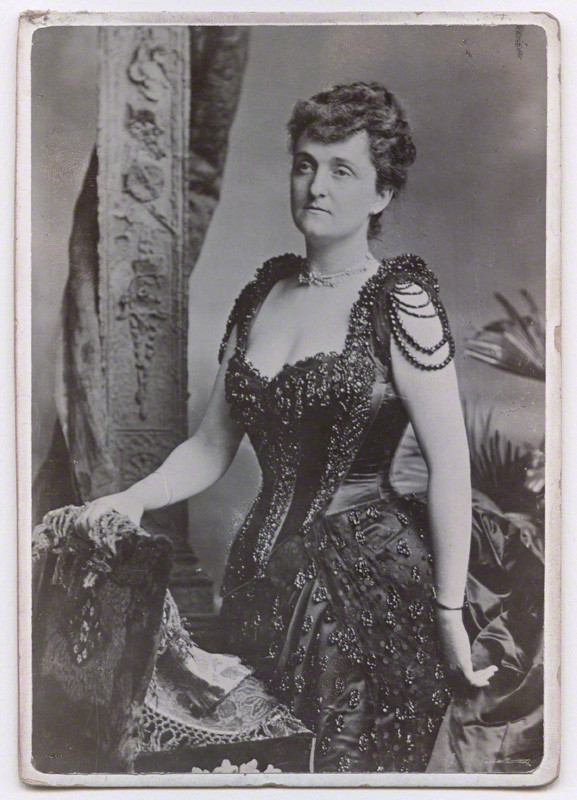Illustration by Erin Aniker
When millions sat down to watch the wedding of Prince Harry and Meghan Markle, it was hailed as a watershed moment for the British monarchy. Some commentators ventured that Harry’s decision to marry a biracial American divorcee and actress proved how much society had moved on from the dark days of the 1930s, when the monarchy was rocked by the relationship of King Edward VIII and the American socialite Wallis Simpson.However, the union isn’t quite as unusual as it appears. In fact, between the 1870s until 1914 there was a wave of transatlantic marriages between rich American women and aristocratic gentlemen. And one of the first to take the leap across the pond was Consuelo Yznaga, a vivacious Southern belle who overcame snobbery and prejudice to take British society by storm.Consuelo was born into a privileged but unconventional family in Louisiana. Despite being one of the richest families in the area, the Yznagas’ Cuban heritage marked them out as outcasts in American high society. They were desperate for social acceptance and saw Consuelo as their way in. At the same time, a number of impoverished English aristocrats began to arrive in the States. They offered the social cachet that the family and other heiresses craved—in return for a healthy dowry, of course. It was a simple transaction: cash for a title.“The United States had come into its own and was really rich,” explains historian Charles Jennings. “Britain and the aristocracy had peaked, so you had a lot of money on one side and on the other, aristocrats who owned land that was usually a drain.”
Watch: The Young Girls Whose Feet Never Touch the Ground While many heiresses entered into such marriages with no expectation of personal happiness, when Consul met George Victor Drogo ("Kim") Montagu, the future Duke of Manchester, she genuinely fell in love.After a whirlwind romance, the couple married in New York on 22 May 1876, signalling to the rest of society that the Yznagas had finally arrived. Kim’s parents had sent a friend to try and prevent the marriage, but he ignored them. Not long after, Consuelo arrived in London to meet her in-laws and received a frosty reception. The British upper classes were generally hostile to the American invaders who threatened to snap up their eligible young men. Although their money was welcome, the Yankee arrivistes were sneered at for their perceived lack of taste and ostentatious ways.“They were more glamorous and could afford the very best dresses,” explains Jennings when I ask him why the heiresses were so conspicuous in Britain. “If you were the British aristocracy, you didn’t want to appear too flash—but that didn’t hold Americans back.”
While many heiresses entered into such marriages with no expectation of personal happiness, when Consul met George Victor Drogo ("Kim") Montagu, the future Duke of Manchester, she genuinely fell in love.After a whirlwind romance, the couple married in New York on 22 May 1876, signalling to the rest of society that the Yznagas had finally arrived. Kim’s parents had sent a friend to try and prevent the marriage, but he ignored them. Not long after, Consuelo arrived in London to meet her in-laws and received a frosty reception. The British upper classes were generally hostile to the American invaders who threatened to snap up their eligible young men. Although their money was welcome, the Yankee arrivistes were sneered at for their perceived lack of taste and ostentatious ways.“They were more glamorous and could afford the very best dresses,” explains Jennings when I ask him why the heiresses were so conspicuous in Britain. “If you were the British aristocracy, you didn’t want to appear too flash—but that didn’t hold Americans back.” For Consuelo, the initial promise of her love match soon faded away. The marriage was a disaster from the start. Kim’s father was mistaken if he hoped that she would help curb his son’s spendthrift ways. After Consuelo’s husband racked up large debts, her father-in-law sent the couple to Tandragee Castle in Ireland; a remote, isolated part of the family’s estate. Consuelo was miserable, writing to a friend in reply to an invitation that Kim’s “movements are so erratic that I think I had better say he won’t come with me on Sunday. He so often disappoints me that I generally make up my mind to go without him.”Relations failed to improve when the couple returned to England. Kim spent increasing amounts of time away from home, leaving Consuelo to navigate the English upper classes alone. She turned to other American heiresses for advice, including Jennie Jerome, the wife of Lord Randolph Churchill and mother of Winston Churchill. This coterie of young, vivacious women quickly established themselves as firm favourites of Queen Victoria’s eldest son, Bertie, the Prince of Wales. By hosting intimate dinner parties and card soirees, they entertained the bored heir to the throne in a way that rivalled his usual circle of friends.
For Consuelo, the initial promise of her love match soon faded away. The marriage was a disaster from the start. Kim’s father was mistaken if he hoped that she would help curb his son’s spendthrift ways. After Consuelo’s husband racked up large debts, her father-in-law sent the couple to Tandragee Castle in Ireland; a remote, isolated part of the family’s estate. Consuelo was miserable, writing to a friend in reply to an invitation that Kim’s “movements are so erratic that I think I had better say he won’t come with me on Sunday. He so often disappoints me that I generally make up my mind to go without him.”Relations failed to improve when the couple returned to England. Kim spent increasing amounts of time away from home, leaving Consuelo to navigate the English upper classes alone. She turned to other American heiresses for advice, including Jennie Jerome, the wife of Lord Randolph Churchill and mother of Winston Churchill. This coterie of young, vivacious women quickly established themselves as firm favourites of Queen Victoria’s eldest son, Bertie, the Prince of Wales. By hosting intimate dinner parties and card soirees, they entertained the bored heir to the throne in a way that rivalled his usual circle of friends.
Advertisement
Watch: The Young Girls Whose Feet Never Touch the Ground

Advertisement

Advertisement
Consuelo was at the centre of it all. Her penchant for telling risqué stories while smoking a cigar was considered vulgar by society stalwarts but was a much-needed breath of fresh air for Bertie. Despite fierce opposition from more conservative members of society, Bertie’s acceptance of Consuelo meant that doors to the most influential ballrooms around the country began to open. However, money remained a constant worry. Consuelo’s circumstances deteriorated so badly that when Bertie announced that he was coming to dinner, she had to ask her friends to each bring a dish to feed the gluttonous Prince.Her solution to her mounting debts was to offer her services to other American heiresses keen to find a titled husband in England. Consuelo would offer etiquette lessons to her charges and ensure they were introduced to the right people for a small fee. In 1882, Parliament passed the Married Women’s Property Act, which outlined a married woman’s right to retain and control her own property rather than automatically surrendering it to her husband. This change to the law meant that any money Consuelo earned she could now keep and control.By the time Kim inherited the Dukedom in 1890, Consuelo had become a firm favourite in high society. But she barely saw her husband, and she was humiliated when the newspapers reported that he was living with a music hall singer. Kim died two years later, freeing Consuelo from the constraints of marriage. Using her skills to pave the way for other would-be transatlantic brides, Consuelo became self-sufficient. Consuelo would enjoy the favour of Bertie for the rest of her life, making her one American trailblazer who won the affections of royalty long before Meghan Markle.